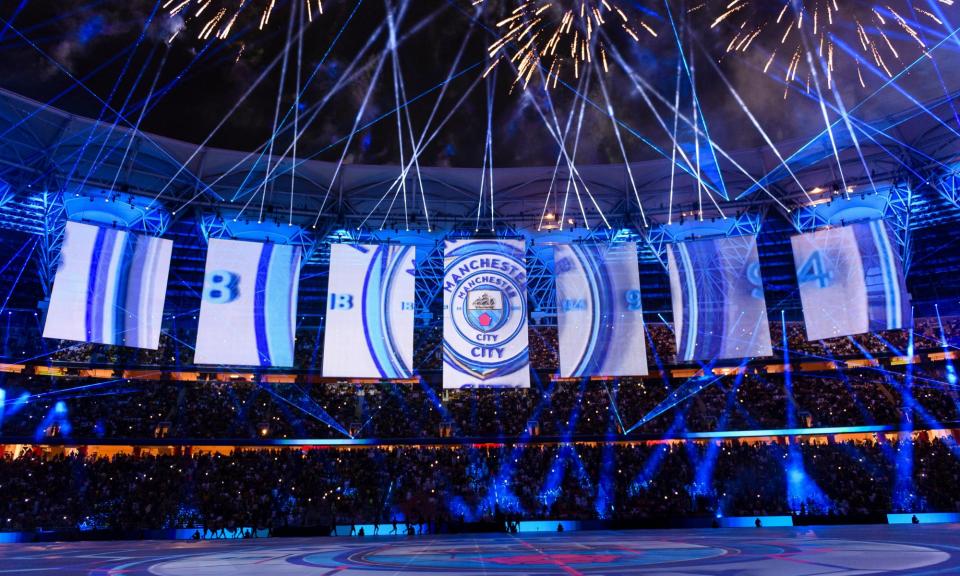Manchester City’s 25-year journey from York to the Club World Cup

The 1998-99 season was pivotal in Manchester City’s history, culminating in the dramatic penalty shootout victory against Gillingham in the Second Division playoff final – but with Christmas approaching, they were facing the prospect of another year in the third tier.
The nadir came 25 years ago to the day of their Club World Cup semi-final against Urawa Reds in Jeddah, 19 December 1998, more than 4,000 miles away literally – and millions metaphorically – at York City’s Bootham Crescent. City had not won in four before their trip to the little ground near the station and 7,527, although most of east Manchester claim they were in attendance, witnessed another defeat thanks to goals from Gordon Connelly and Andy Dawson, while City’s consolation came from the much-lamented Craig Russell.
Related: Manchester City handed Copenhagen test in Champions League last 16
“When York went 1-0 up 90 seconds in, I was queuing up for the tea bar and I remember saying to the guy behind me: ‘Did that just fucking happen?’,” says City fan David Mayor. “In the second half I stood about 15 yards behind Curly Watts [actor Kevin Kennedy], which makes it about the most City day out ever. The coach home wasn’t aggressive infighting but there was a lot of disagreement over what was wrong, what needed to be done and if that was the lowest it could get, which it obviously was.”
Since dropping out of the Premier League in 1996, the atmosphere at Maine Road had soured. Fans were unhappy with the running of the club, Joe Royle and Willie Donachie taking the brunt of the criticism on the touchline. The defeat in York left City 12th in the third tier, their lowest position in the club’s history. “It hadn’t gone to plan,” the former City centre-back Nick Fenton says.
“We had dropped down into League One, as it is now, and I came into the first team from the youth team. The expectation was that we were going to blow it away and smash it out the park everywhere we went, beating everyone along the way and it did not turn out like that.”
By the time the full-time whistle was blown at Bootham Crescent, City had won seven of 22 league games. Things were bleak heading into Christmas with no fairy lights at the end of the tunnel. “If you were to pick one match that would be the nadir, this would be it, but the whole two-year period was grim,” Mayor says. “How it turned around after that, I do not know.”
Fenton was thrust into the first-team as a teenager by Royle, who was looking to build a side capable of getting out of the league at the first time of asking. A tall and elegant defender, he was afforded 15 matches in the Second Division but struggled with the physicality of the strikers, admitting he was “bullied” in games, and would play only twice more for the club. Royle had realised in October he needed someone who was suited to the standard and brought in the rugged Andy Morrison to lead them up the table, although he was absent at York.
It was a good City squad, many of whom would help earn promotion to the Premier League the following season but they had suffered defeats at Lincoln and Wycombe as the club continued to spiral. “I hate it when people say how great those days were,” Mayor says.
“People say it was better than now; it was nice going to different towns and getting drunk there rather than the ones you go to every year but the away end was like a powder keg as soon as we went 1-0 down. I think people are looking through rose-tinted glasses when they say it was better. Getting beat and not being able to see a way back was grim.”
York would go on to be relegated and fewer than 20 years later were playing regional football in the National League North. The paths for the clubs were very different, with City’s turnaround beginning a week later at Wrexham, followed by a comeback victory over Stoke at Maine Road. They would only lose once in the final 24 matches on their way to securing third spot in the league before their Wembley triumph.
Related: Twenty years after: Paul Dickov and Manchester City’s 1999 play-off win | Jamie Jackson
“City are such a massive club,” says Fenton, who now works as a physio at Coventry. “I was at Burton for the past five years and every time we played Sunderland or Sheffield Wednesday, they were massive games for the club, and City is on a different level to even them. To be going to clubs at the bottom of League One, it really is their cup final, something the players and fans have been looking forward to all season, and they are going to give that extra bit of effort, which puts you on the back foot and you are immediately up against it.”
Paul Dickov’s late equaliser and Nicky Weaver’s shootout save against Gillingham in the playoff final are iconic moments for the club that sparked a revival in fortunes after a dour period. It helped City mark their first season at their new home, then named the City of Manchester Stadium, although they had been relegated in 2000-01 before bouncing back under Kevin Keegan and by now Sheikh Mansour’s wealth has transformed them into the trinket collectors they are today.
York away is part of City’s history – a far more significant element than whatever happens this week in Jeddah. This might be the best of times to be a City fan making it a lot easier to raise a smile at the worst. From Tony Vaughan to Kevin de Bruyne, it’s been one hell of a journey.

 Yahoo Sport
Yahoo Sport 





































